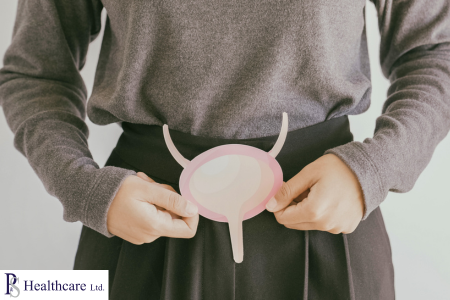10 Effective Ways to Stop Bladder Leaks & Manage Incontinence

Bladder leaks, or urinary incontinence, are a common challenge that can affect people of all ages. Whether caused by aging, childbirth, or certain medical conditions, it can be an uncomfortable and sometimes embarrassing issue. However, the good news is that there are simple, practical ways to manage and even reduce bladder leaks. In this article, we’ll explore ten effective strategies that can help you regain control and confidence, allowing you to live without the constant worry of leaks disrupting your daily life.
Bladder leaks, or urinary incontinence, are a common challenge that can affect people of all ages. Whether caused by aging, childbirth, or certain medical conditions, it can be an uncomfortable and sometimes embarrassing issue. However, the good news is that there are simple, practical ways to manage and even reduce bladder leaks. In this article, we’ll explore ten effective strategies that can help you regain control and confidence, allowing you to live without the constant worry of leaks disrupting your daily life.
1. Do daily pelvic floor exercises
Pelvic floor exercises can be effective at reducing leaks. It's important to do them properly and include short squeezes and long squeezes.
2. Stop smoking
If you smoke, you put yourself at risk of incontinence, because coughing puts strain on your pelvic floor muscles.
3. Do the right exercises
To strengthen your pelvic floor to relieve symptoms, replace high-impact exercise, such as jogging and aerobics, with strengthening exercise, such as Pilates.
4. Avoid lifting
Lifting puts strain on your pelvic floor muscles, so avoid it whenever you can.
5. Lose excess weight
Being overweight can weaken your pelvic floor muscles and cause incontinence because of the pressure of fatty tissue on your bladder.
6. Treat constipation promptly
Straining to poo weakens your pelvic floor muscles and makes urinary incontinence worse.
7. Cut down on caffeine
Caffeine irritates the bladder and can make incontinence worse. Coffee has the biggest effect, so stop drinking it or switch to decaffeinated coffee.
8. Cut down on alcohol
Alcohol is a diuretic, which makes you urinate more often. Cutting down may help incontinence symptoms.
9.Drink plenty of water
Drink 6 to 8 glasses of fluid a day (but no more) unless your doctor advises you otherwise.
10. Eat the right foods
Avoid spicy and acidic foods, such as curries and citrus fruits, as they can irritate the bladder and make leaks and other incontinence symptoms worse.
Living with bladder leaks doesn’t have to hold you back. By incorporating these ten strategies into your routine, you can take proactive steps to manage incontinence and improve your quality of life. From lifestyle adjustments to specialised products, there are many solutions available to help you stay dry and comfortable. Don’t hesitate to consult a healthcare professional for personalised advice, and remember that with the right approach, you can significantly reduce or even stop bladder leaks altogether.
#Bladder Leaks #Urinary Incontinence #Incontinence Management #Bladder Control #Pelvic Floor Exercises #Preventing Bladder Leaks #Incontinence Solutions #Women's Health #Men's Health #Lifestyle Tips for Incontinence #Incontinence Products #Bladder Health #Managing Urinary Incontinence #Healthy Aging #Pelvic Health
More News:
- Why Ladies Washable Incontinence Pants Are Better for the Planet
- Understanding Why Older Children Still Wet the Bed and What You Can Do About It
- Travelling with Incontinence: Best Washable Incontinence Pants for Men on the Go
- Your Guide to Washable Incontinence Pants for Ladies: FAQs Answered
- The Benefits of Switching to Washable Incontinence Products
- 8 Everyday Activities That Can Strengthen or Weaken Your Bladder
- 10 Things You Should Pack in an Incontinence Emergency Kit
- 10 Foods to Eat and Avoid for Better Bowel Control
- 8 Ways Stress and Anxiety Can Affect Bladder Health
- 10 Signs It's Time to See a Doctor About Your Urinary Incontinence
- 10 Tips for Talking to Your Child About Bedwetting
- 10 Things You Should Know About Postpartum Incontinence
- 10 Common Triggers of Urinary Incontinence in Women Over 50
- 10 Tips for Night-Time Incontinence Management in Adults
- 10 Ways to Manage Incontinence While Playing Sports
- 10 Tips for Managing Faecal Incontinence in Adults
- 10 Lifestyle Changes to Manage Urinary Incontinence Symptoms
- 10 Ways to Manage Urinary Incontinence During Pregnancy
- 10 Causes of Urinary Incontinence in Men and How to Treat Them
- 10 Practical Solutions for Coping with Incontinence at Work
- 10 Myths About Menopause and Incontinence You Should Stop Believing
- 10 Foods to Avoid to Prevent Bladder Irritation and Incontinence
- 10 Effective Pelvic Floor Exercises for Urinary Incontinence
- 10 Common Causes of Bedwetting in Children and How to Address Them
- Causes of Faecal Incontinence
- Breaking the Silence: Managing Incontinence with Confidence
- Supporting Loved Ones with Incontinence: A Caregiver's Guide
- Top 10 Tips for Managing Incontinence Comfortably This Christmas
- Pregnancy and Postpartum Incontinence: Prevention and Recovery
- 10 Random Facts About Pee You Probably Didn't Know
- Diet and Bladder Health: Foods That Help and Hurt
- Helping Your Child Manage Incontinence: A Parent's Resource
- The Most Common Bladder Control Problems and How to Manage Them
- 10 Things That Can Make Incontinence Worse
- Incontinence Myths vs Facts - Dispelling Common Misconceptions
- Top 10 tips to help with bladder control during pregnancy
- 10 Effective Ways to Stop Bladder Leaks & Manage Incontinence
- P&S Washable Face Mask with ViralOff
- New Product For Men - The Slip Brief
- New Monthly Protection Briefs For Women
- New Product - The OooPS Pant for Stress Incontinence
- New Adult Inco-elite Range Launched
- EMDA WOMEN OF WORTH AWARD 2009
- New Website Launched
- New Website Under Development

